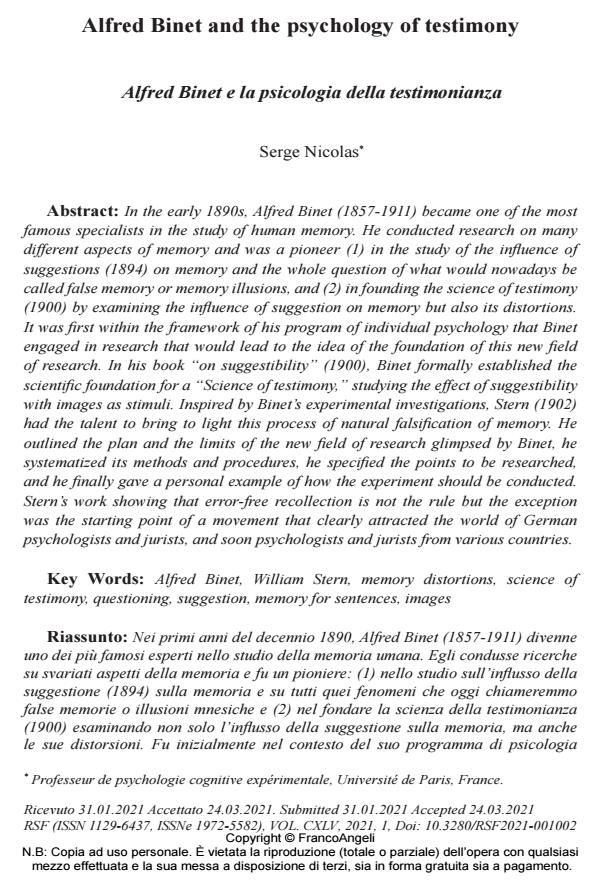Alfred Binet and the psychology of testimony
Titolo Rivista RIVISTA SPERIMENTALE DI FRENIATRIA
Autori/Curatori Serge Nicolas
Anno di pubblicazione 2021 Fascicolo 2021/1
Lingua Inglese Numero pagine 27 P. 13-39 Dimensione file 266 KB
DOI 10.3280/RSF2021-001002
Il DOI è il codice a barre della proprietà intellettuale: per saperne di più
clicca qui
Qui sotto puoi vedere in anteprima la prima pagina di questo articolo.
Se questo articolo ti interessa, lo puoi acquistare (e scaricare in formato pdf) seguendo le facili indicazioni per acquistare il download credit. Acquista Download Credits per scaricare questo Articolo in formato PDF

FrancoAngeli è membro della Publishers International Linking Association, Inc (PILA), associazione indipendente e non profit per facilitare (attraverso i servizi tecnologici implementati da CrossRef.org) l’accesso degli studiosi ai contenuti digitali nelle pubblicazioni professionali e scientifiche.
In the early 1890s, Alfred Binet (1857-1911) became one of the most famous specialists in the study of human memory. He conducted research on many different aspects of memory and was a pioneer (1) in the study of the influence of suggestions (1894) on memory and the whole question of what would nowadays be called false memory or memory illusions, and (2) in founding the science of testimony (1900) by examining the influence of suggestion on memory but also its distortions. It was first within the framework of his program of individual psychology that Binet engaged in research that would lead to the idea of the foundation of this new field of research. In his book "on suggestibility" (1900), Binet formally established the scientific foundation for a "Science of testimony", studying the effect of suggestibility with images as stimuli. Inspired by Binet’s experimental investigations, Stern (1902) had the talent to bring to light this process of natural falsification of memory. He outlined the plan and the limits of the new field of research glimpsed by Binet, he systematized its methods and procedures, he specified the points to be researched, and he finally gave a personal example of how the experiment should be conducted. Stern’s work showing that error-free recollection is not the rule but the exception was the starting point of a movement that clearly attracted the world of German psychologists and jurists, and soon psychologists and jurists from various countries.
Nei primi anni del decennio 1890, Alfred Binet (1857-1911) divenne uno dei più famosi esperti nello studio della memoria umana. Egli condusse ricerche su svariati aspetti della memoria e fu un pioniere: (1) nello studio sull’influsso della suggestione (1894) sulla memoria e su tutti quei fenomeni che oggi chiameremmo false memorie o illusioni mnesiche e (2) nel fondare la scienza della testimonianza (1900) esaminando non solo l’influsso della suggestione sulla memoria, ma anche le sue distorsioni. Fu inizialmente nel contesto del suo programma di psicologia individuale che Binet intraprese ricerche che lo condussero all’idea di fondare questo nuovo campo di ricerca. Nel suo libro "sulla suggestione" (1900) Binet stabilì le fondamenta scientifiche per una "Scienza della testimonianza", studiando gli effetti della suggestionabilità usando delle figure come stimoli. Ispirato dalle ricerche sperimentali di Binet, Stern (1902) fu in grado di far luce sul processo di naturale falsificazione della memoria. Egli delineò il progetto e i confini del nuovo campo di ricerca intravisto da Binet, ne sistematizzò metodo e procedure, specificò gli obiettivi di ricerca e, infine, offrì un personale esempio di come tali ricerche andassero condotte. L’opera di Stern, mostrando che il ricordo libero di errori non rappresenta la regola ma piuttosto l’eccezione, costituì il punto di partenza di un movimento che chiaramente interessò la comunità degli psicologi e giuristi tedeschi, e ben presto anche di altri vari Paesi.
Parole chiave:Alfred Binet, William Stern, distorsioni della memoria, scienza della testimonianza, suggestione, memoria di frasi, memoria di figure.
Serge Nicolas, Alfred Binet and the psychology of testimony in "RIVISTA SPERIMENTALE DI FRENIATRIA" 1/2021, pp 13-39, DOI: 10.3280/RSF2021-001002